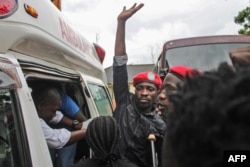Prominent Ugandan opposition lawmaker Bobi Wine has confronted Uganda’s ambassador to the United States about Wine's recent arrest and alleged torture, but many Ugandans did not get to see the interview because of a power outage.
VOA’s "Straight Talk Africa" television program on Wednesday featured the pop star-turned-politician, whose given name is Robert Kyagulanyi, and Ugandan Ambassador to the United States Mull Sebujja Katende.
Wine was accused of attacking the convoy of longtime President Yoweri Museveni during clashes Aug. 13 between government supporters and opponents. Wine's driver, Yasin Kawuma, was fatally shot later that day during the violence; Wine has blamed police for the death, claiming he was the intended target.
Wine and 33 others were arrested, “including four members of parliament,” he said.
Days later, they were charged with violations including treason. They were released.
Wine says that he and the other detainees were brutally beaten and that some sustained permanent injuries or are still in the hospital. He was later released and permitted to travel to the U.S. for medical treatment.
Asked by program host Shaka Ssali whether he believed Wine had been beaten, Katende said, “Uganda does not condone torture.”
The diplomat also said there is no crisis in Uganda, only isolated incidents of criminality. He added, “Uganda remains committed to the tenets of democracy, rule of law and respect for human rights.”
Wine responded, “The criminality is not being carried out by Ugandan citizens. It is actually being carried out by the armed forces. ... If that’s not criminality, I wonder what it is.”
Wine said the men who beat him belonged to the Special Forces Command, a part of the Ugandan military charged with guarding the president.
“I was beaten, kept in handcuffs. A lot of despicable things were done to me. But I’m here, and I’m still alive,” he said.
Wine claimed, in a lengthy Facebook post last week, that soldiers had hit him with an iron bar. They also "beat me, punched me and kicked me with their boots. No part of my body was spared," he alleged, adding that his testicles were squeezed.
Ugandan authorities have steadfastly rejected the claim of torture. In a subsequent statement, government spokesman Ofwono Opondo said: "If indeed Bob Wine was tortured ... as being claimed, he should quickly return to Uganda to raise those matters before court. ... Uganda is a law-abiding country."
Power interrupted
While the interview was live-streaming, Uganda’s power authority tweeted that power had gone out “in most areas” because of a system failure.
Some Ugandans tweeted back to accuse the company of interrupting service to deny them access to the VOA program.
“Seems they don’t want us watch bobiwine on tv,” one person tweeted.
Another said, “This power blackout is political.”
Power was restored later in the evening.
After the program, Katende and Wine were informed of the power interruption and of social-media speculation about its cause. The ambassador urged against jumping to conclusions.
Wine, in a subsequent VOA interview, suggested the power lapse was deliberate but ineffective. "[B]efore long, everybody in Uganda will watch that program," he said. "… You can go on Facebook and watch the entire program. We are unstoppable. They cannot stop us. We are going to communicate, and we're going to listen to each other. "
He also said that he intended to return to Uganda "next week. … Man, that's my home, yo. That's where I come from, that's where I'm born, and that's where I'm going to be buried. So make no mistake: I am going back to Uganda."
Last Thursday, Wine held a Washington news conference at which he and his U.S.-based attorney urged the United States to stop sending military aid to Uganda.
Robert Amsterdam said military equipment provided to Uganda's military through American tax dollars "is being used in a war of terror against Uganda's citizens."
Peter Clottey and James Butty, of VOA’s English to Africa Service, contributed to this report.





